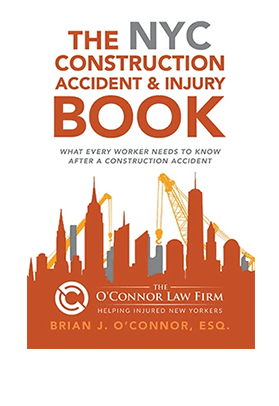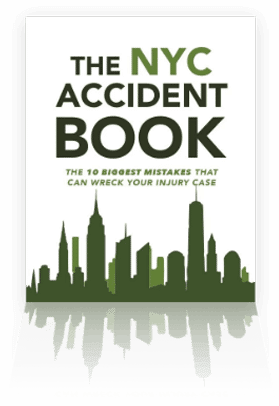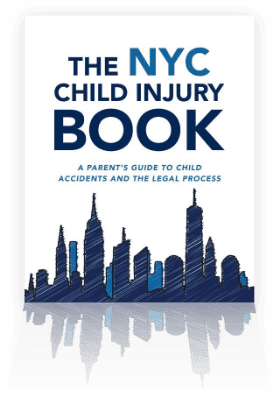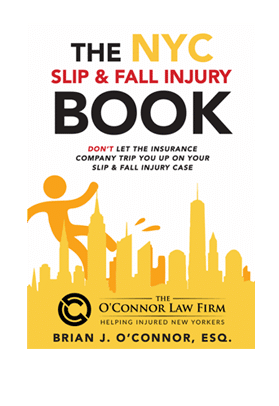Snow & Ice Accidents Attorney in New York
Property owners and their agents have a responsibility to maintain their properties in a reasonably safe condition. This includes the safe removal of snow and ice hazards during the winter months.
If you were injured on someone’s property, including interior walkways, stairs, parking lots or sidewalks, you need to contact an experienced New York City injury lawyer as soon as possible as your time may be limited to bring a claim depending on who is responsible for your accident. If the City of New York is responsible for your sidewalk slip and fall, or other municipal entity, you only have ninety (90) days to file a notice of claim or your case could be dismissed.
Causes of Snow and Ice Falls

New Yorkers may find themselves slipping and falling on snow and ice too often during the winter. While “accidents happen” from time to time, many of these “accidents” are not random or unavoidable. Instead, many falls occur because property owners and their agents, fail to timely clear ice and snow from their premises, including adjoining sidewalks.
In some cases, the property owner or agent does something to create the dangerous condition that leads to the slip and fall such as piling snow up at the top of a driveway until it later melts and flows down onto a walkway which later re-freezes. Other common causes of snow and ice falls include:
- Inadequate shoveling which leaves snow and ice patches;
- Failure to adequately salt and sand after shoveling;
- Failing to remove snow and ice within a reasonable time after a snowfall;
- Icy sidewalks, steps and handrails;
- Failure to remove hanging icicles which later melt, drip down onto walkways, and refreeze when the temperature drops;
- Water leaks that cause an accumulation of water that later freezes;
New York City Snow and Ice Law
There are several New York City codes that apply to snow and ice cases. These rules provide guidelines for who may be at fault for your snow and ice injuries. These laws also provide guidance for the proof necessary to win your case.
It is important that you contact an experienced snow and ice accident attorney who understands the nuances of these laws. If you sue the wrong party or wait too long to file your claim, your case may be dismissed.
Administrative Code Section 16-123
Section 16-123: “Removal of snow, ice and dirt from sidewalks” requires every property owner, lessee, tenant and occupant to remove snow and ice hazards from their adjacent sidewalks within four hours after a snowfall ends. This four-hour window excludes the hours between 9:00 p.m. and 7:00 a.m.
Section 16-123 also provides that if the snow and ice is frozen and cannot be removed without damage to the pavement, the owner may use sand, sawdust or other similar material to alleviate the condition provided they thoroughly clean the sidewalk when the weather permits.
Note: The failure to comply with Administrative Code 16-123 may result in a fine and/or imprisonment of ten days. However, the statute does not state that a property owner will be liable for injuries for the failure to timely remove snow and ice.
Administrative Code Section 7-210
Section 7-210: “Liability of real property owner for failure to maintain sidewalk in a reasonably safe condition.” In 2003, the City of New York shifted liability from itself to most (but not all) property owners, including commercial businesses and investment property owners for injuries caused by the failure to remove snow and ice hazards from sidewalks adjacent to their properties.
The law excludes 1, 2, and 3-family homes which are partially owner-occupied as long as they are exclusively used for residential purposes. For sidewalks adjacent to these smaller, owner-occupied homes, the City of New York continues to be legally responsible for injuries for failure to remove snow and ice from these sidewalks within a reasonable time.
What Do I Need To Prove
To Win My Snow and Ice Case?
The elements of proof in a snow and ice case are generally the same, whether you slipped and fell on private property or on a sidewalk adjacent to a commercial property or on a sidewalk in front of a single-family home. Once you determine the identity of the responsible party, you must establish that they:
- had notice of the dangerous snow and ice condition prior to your accident and failed to remove the condition within a reasonable time thereafter; or
- caused and created the dangerous snow and ice condition by improperly shoveling and/or removing the snow and ice, making the condition worse;
Factors That Determine Reasonableness
The key difference between the City of New York and a private property owner is what defines “reasonableness.” What might be considered “reasonable notice” for a commercial business may not be reasonable notice for the City of New York. Typically, the issue of reasonableness is a question of fact for a jury. The courts will look to a number of factors to determine reasonableness, including:
- accumulation of snow during the most recent storm;
- duration between the end of the storm and the accident;
- temperature at the time of the accident and the duration of time below freezing from the end of the storm to the accident;
- extent of the City’s snow removal plan and the location of the accident in reference to the City’ plan (whether the sidewalk at issue was on a major roadway, near a bus stop or street corner, or in a residential neighbor referred to as a “tertiary street”).
Storm In Progress Rule

Pursuant to the storm in progress rule, a property owner will not be found liable if an injury occurs while a storm is still ongoing or within a reasonable period of time after the storm has ended.
What Should I Do After a Snow and Ice Accident?
Slip and fall accidents on snow and ice can result in serious injuries, including fractures, spinal cord injuries and head injuries. To protect your rights, it is important to take the following steps after a snow and ice accident:
- Call for an ambulance and get help as soon as possible. You may have sustained a more serious injury than you suspect. You are also more susceptible to a further slip and fall if you attempt to get up and continue to walk on the same hazardous snow and ice that caused your fall. Insurance companies will also argue that your injuries were not causally related to the accident if too much time passes before you seek medical attention.
- Take photos of the snow or ice condition that caused your fall. Snow and ice conditions will change or even disappear soon after an accident, even if the property owner does not affirmatively take steps to remove it. Evidence of the dangerous nature of the snow and ice will disappear with warmer temperatures.
- Get the contact information of eye witnesses.If there are people who witnessed the accident, obtain their contact information. This evidence will be lost forever if it is not collected at the accident scene. Your attorney can obtain more detailed information later if you can obtain witnesses’ initial contact information.
- Report the accident to the property owner or tenant. Without a record of the accident, an insurance carrier will dispute the accident ever happened.
- Do not speak to the property owner’s insurance adjuster. When an insurance company learns of an accident claim, they will quickly contact you and try to get a recorded statement. Do not agree to this. The insurance company does not have your best interests. Their goal is to save themselves money and blame you for the accident. Call an experienced New York City injury lawyer as soon as possible before you speak to an insurance adjuster.
Call an Experienced New York City
Snow and Ice Attorney
Brian J. O’Connor has been litigating sidewalk accident cases for more than 20 years and understands the unique laws that apply to municipal defendants and the exceptions that may apply to property owners. We retain safety experts and meteorologists to assist in prosecuting snow and ice cases who can explain how a property owner’s actions contributed to your injuries.
O’Connor Injury Law is available to answer your questions today and help you get the compensation you deserve. Call us at 212-566-4868 or 718-948-3500. All initial consultations are free. You do not pay us until we win your case.




